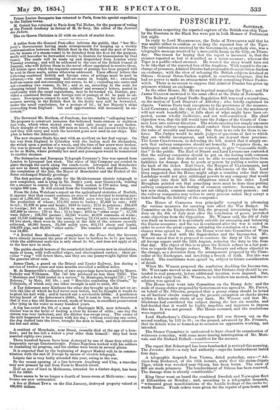POSTSCRIPT.
SATunDAY. Questions respecting the reported capture of the British war-ship Tiger by the Russians in the Black Sea were put in both Houses of Parliament last night.
In reply to Lord IlIsraissinnix, the Duke of NEWCASTLE said that he was unable either to confirm or to deny the reported loss of the Tiger. The only information received by the Government, or anybody else, was a telegraphic message received by a mercantile house in the City, on Thurs- day. One reason for hoping that the report is incorrect is, that the steamer reported as lost is described as a screw-steamer ; whereas the Tiger is a paddle-wheel steamer. He trusted the story would turn out to be like that of the reported loss of the Amphion. With regard to the ex- change of prisoners, Admiral Dundas had proposed to General Osten-Sacken an exchange, with the view of releasing the British subjects detained at Odessa : General Osten-Sacken replied, in courteous language, that he had no power to make an arrangement without consulting Prince Paskie- witch. There is no reason to suppose that Admiral Dundas has given up prisoners without an exchange.
In the other House, Mr. HUME inquired respecting the Tiger ; and Sir JAMES GRAHAM answered to the same effect as the Duke of Newcastle.
The Railway and Canal Traffic Regulation Bill was read a second time, on the motion of Lord STANLEY of Alderley ; who briefly explained its objects. Various Peers took exceptions to the provisions of the measure. Lord CAMPBELL said, the object of the bill is excellent, but the machinery will not work beneficially ; it falls short of what might have been ex- pected, seems wholly ineffective, and not well-considered. His chief objection was, that the bill would turn the Judges of the Courts of Com- mon Law into railway directors. The whole enacting law simply amounts to this, that railway companies shall conduct their business according to the rules of morality and honesty. But there is no rule for them to en- force. The Judges would be made judges of questions of fact to which they are wholly incompetent, and which are beyond their province. The LORD CHANCELLOR, in defending the bill, denied that it simply en- acts that railway companies should act honestly. It requires them, as innkeepers and common carriers are required, to give "reasonable facili- ties" to the public. The Earl of DERBY and Lord LYNDHURST contended that the railway companies should be put on the footing with common carriers; and that they should not be able to exempt themselves from liabilities for damage done to goods or person by putting a notice upon the back of the ticket. Earl GREY, the Marquis of CLANRICARDE, and Lord Thintion.asi, also complained of the deficiencies of the bill. Lord Grey suggested that the House might adopt a standing order that their Lordships would not give additional powers to any company that would not adopt into their bill the obligations stated in the order. Lord Brougham pointed out that something more must be done than putting railway companies on the footing of common carriers; because, as the law now stands, common carriers are not obliged to carry persons ; and the railway companies may refuse to carry persons unless they accept a ticket limiting the liability of the companies.
The House of Commons was principally occupied in advancing the various measures for carrying into effect the War Budget. In Committee on the Excise-duties Bill, the proposal determining the malt- duty on the 5th of July next after the conclusion of peace, provoked some objections from the Opposition. Mr. WilsoN said, the 5th of July was fixed on because it is peculiarly suitable for arranging and balancing the Excise accounts ; and the tax is continued after the war is ended in order to cover the great expense attending the conclusion of a war. The clauses were agreed to. Next, the House went into Committee of Ways and Means to deal with the Sugar-duties and the Income-tax. Mr. WILSON stated that it is proposed to continue the duty of 178. 4d. upon all foreign sugars until the 16th August, reducing the duty to 16:. from that day. The object of this is to place the British refiner in a fair posi- tion as regards the foreign refiner. Mr. Alornipr and others objected to the change, as a deviation from the arrangement proposed by the Chan- cellor of the Exchequer, and involving a breach of faith. But this was refuted. The resolutions were agreed to, subject to future consideration of detail.
When Mr. WiLsox proposed the resolution doubling the Income-tax, Mr. Wirmaais moved as an amendment, that Probate-duty should be ex- tended to real property, before additional taxation were imposed. But, after a brief reply from Mr. Wnsoic, he withdrew his motion, and the re- solution was agreed to. The House next went into Committee on the Stamp Acts: and the scale of stamp-duties proposed by Government was agreed to. Mr. PRINZ(' on behalf of Mr. Oliveira, proposed that a penny stamp should be levied on all bankers' checks removing the present exemption on checks drawn within a fifteen-mile circle of any bank. Mr. WiLsox said that Mr. Gladstone had considered the subject during the last six menthe, and. had decided that it would be highly impolitic and injurious to impose this tax. It was not pressed. The House resumed, and the resolutions were reported.
Lord Shaftesbury's Chimney-Sweepers Bill was thrown out on the second reading, by 112 to 39; on the ground, advanced by Mr. Ennio; that its details were so framed as to occasion an oppressive working, not intended.
The Stoner Committee is understood to have closed its examination of witnesses yesterday, with some more teasing interrogation of Mr. Men- vale and Sir Richard Bethell—resultless for the accuser.


























 Previous page
Previous page